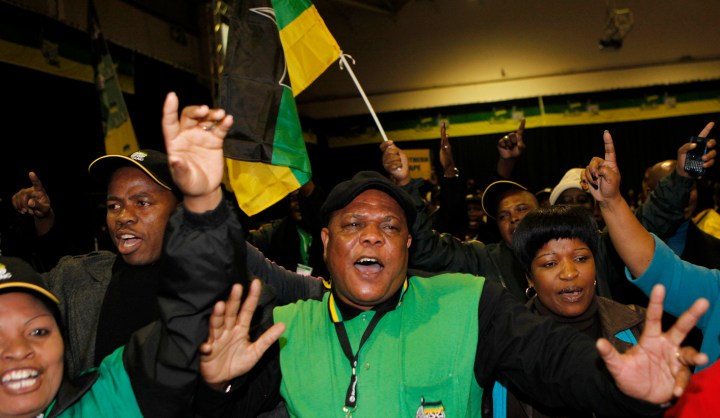South Africa
ANC policy conference, Day 3: Partial nationalisation of mines on the cards

A week of high drama at the ANC policy conference could end with a highly controversial resolution on the nationalisation of mines. While the resolution could have far-reaching consequences for South Africa’s economy, it is already causing a fallout within President Jacob Zuma’s camp in the ANC. By RANJENI MUNUSAMY.
The ANC could decide on today to introduce limited nationalisation of mines in South Africa as part of the “radical shift” in economic policy the party is pushing for. The party’s policy conference, wrapping up in Midrand this afternoon, could opt for 30% state ownership of mines, based on discussions at the commission dealing with state intervention in the mining sector.
The proposal for the 30% state share in mines was made to the commission by ANC secretary general Gwede Mantashe. The ANC’s senior leaders have, up to now, fought off attempts to put nationalisation on the ANC agenda, despite concerted attempts by the ANC Youth League and the National Union of Metalworkers to strong-arm the party into adopting the policy, reasoning that in this way, all citizens benefit from the country’s mineral wealth.
However, President Jacob Zuma indicated in his opening address to the conference, and during a media briefing this week, that he wanted the conference to look into extraordinary measures to accelerate economic transformation. He said South Africa’s high rate of poverty, inequality and unemployment levels necessitated “radical” and “dramatic” change. He could not say what these changes would entail.
In a surprise move, Mantashe proposed to the commission on the mining sector that instead of black economic empowerment shareholding in mines, the state should have a percentage share in mining ventures. The proposal by Mantashe came in spite of a study commissioned by the ANC’s national executive committee advising against the nationalisation of mines.
Following heated debate at the ANC’s national general council in Durban in 2010, when former ANC Youth League president Julius Malema and his supporters tried to force the ANC to adopt a resolution on nationalisation, it was decided that the NEC should carry out an in-depth study on how to leverage the country’s mineral wealth.
The report, which is contained in the battery of discussion documents before delegates at the policy conference, states that it would cost the state just under one trillion rand to acquire listed mining companies in the country – which exceeds the entire government budget.
“Nationalisation without compensation would require a constitutional change and would result in a near collapse of foreign investment and access to finance, as well as widespread litigation by foreign investors… This route would clearly be an unmitigated economic disaster for our country and our people,” the report states.
However, Mantashe’s proposal would seemingly apply to new mining ventures with lucrative prospects, so as to prevent the state adopting debt in existing mining companies or having to deal with the issue of compensation.
This proposal has not yet been tested before the full plenary of the policy conference, and will only be discussed this morning before Zuma delivers the closing address.
However, Mantashe’s support for limited nationalisation has now pitted him against others in Zuma’s camp, who oppose the proposal. Police minister Nathi Mthethwa, who wields strong influence over Zuma’s KwaZulu-Natal constituency, told the plenary on Thursday that the office of the secretary general should not be articulating policy, and that this should be the domain of the president’s office. Both Mantashe and Mthetwa are key to Zuma’s re-election effort.
The nationalisation proposal could provoke fierce debate today, or could be deferred to the national conference in Mangaung for a final decision. Either way, this week’s conference has brought to the fore serious fissures in the ANC, which are likely to deepen as the leadership battles intensify in the build up to the December elective conference. DM
Photo: Delegates sing during the start of an African National Congress (ANC) policy meeting in Midrand, north of Johannesburg, June 26, 2012. REUTERS/Siphiwe Sibeko















 Become an Insider
Become an Insider